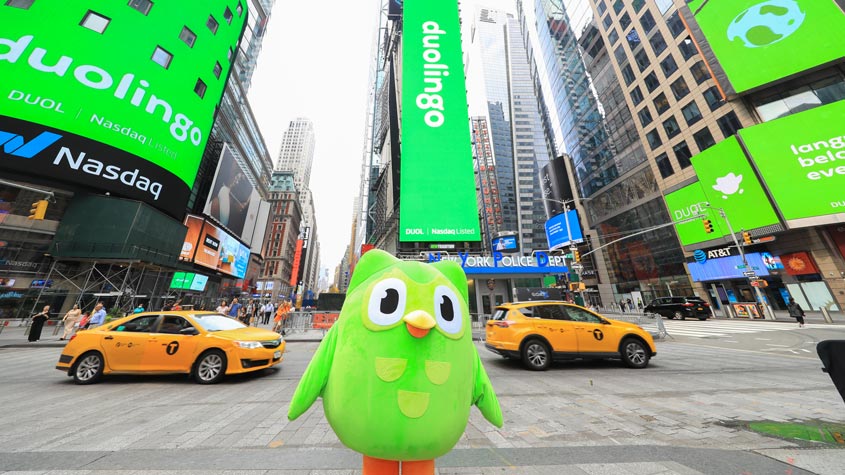Duolingo: learning a new language with an AI owl
Have you ever wanted to become fluent in a foreign language? Technology has made language learning accessible to everyone. Since 2012, the Duolingo app and its owl mascot Duo, have made learning a language an enjoyable experience for over 500 million learners in 194 countries with the help of artificial intelligence (AI) and machine learning.

to harness people’s brainpower through his
science-based language education learning
platform. (Photo: Courtesy of Duolingo)
Inspired by the potential of technology to deliver learning opportunities to people around the world, Duolingo, entered the educational technology field (Ed Tech) ten years ago. It has since become a hugely popular language-learning platform. Its mission is to develop the world’s best educational app and to make it universally available. While Duolingo now ranks among the top language learning apps, its sights are set more broadly on tackling the world’s toughest challenges.
“Our mission goes beyond language learning. The two biggest problems facing humanity are global warming and economic inequality. We believe that the best way to reduce economic inequality is through education,” says Luis von Ahn, CEO of Duolingo.
Mr. von Ahn, a university professor of computer science and a serial inventor, saw the benefits of the Internet as a tool to harness people’s brainpower early on. In his early 20s, he developed “Captcha'' and “reCaptcha”, the online tools that make it possible to differentiate between real users and computer bots for which, along with his work on human computation, he won he won the MacArthur Fellowship award at the age of 27, in 2006.
In 2012, he created and launched Duolingo, a free science-based language education learning platform and app for users. It was a hit from the outset, with over 10 million people downloading the app in the first 12 months. Duolingo now offers hundreds of exercises and challenges to make learning a language fun, and constantly listens to its users to introduce new features to enhance users’ experience of the platform.
Products like the Duolingo app, Duolingo ABC for kids, and Duolingo English Test are based on a proven methodology to foster long-term retention and are available to users free of charge. Duolingo is also working to improve how the app teaches users to speak a language. “We are starting to add conversation lessons in French and Spanish with the idea to practice real-world conversations on the app”, announced Mr. von Ahn at Duocon 2021, the conference for Duolingo learners and language enthusiasts.
An AI Owl
Duolingo values feedback from its users, which the company marries with AI to offer them a customized learning experience. With their new AI model “BirdBrain”, the platform gets inside Duolingo learners’ heads.

“What we do in Duolingo is to turn the properties of having a great teacher into research programs for our AI efforts. We use machine learning and natural language processing to create tools that assist our world-class content developers in auditing and improving hundreds of lessons, challenges and exercises,” said Dr. Burr Settles, Research Director at Duolingo, at Duocon 2021.
The use of AI enables the company to analyze the common mistakes users make and to adapt lessons to users’ learning needs. Duolingo’s new AI system, Birdbrain, profiles each user and makes accurate predictions about their learning journey to ensure a personalized experience. Duolingo is able to do this for its 500 million plus users with the use of AI and machine learning. BirdBrain’s algorithms are embedded in the lessons on the app and their predictions improve over time as more learners use the platform. “We deliver a better learning experience using artificial intelligence (AI). Our lessons constantly adapt to how well the learner is doing on the app,” Mr. von Ahn explains.
We deliver a better learning experience using artificial intelligence (AI). Our lessons constantly adapt to how well the learner is doing on the app.
Luis von Ahn, CEO of Duolingo.
Video: Watch Duocon 2021, organized by Duolingo, is a global conference at the intersection of language, learning, and technology.
Innovation and IP rights
Innovation is at the heart of Duolingo’s business model. "Innovation is at the core of what we do at Duolingo. Developing new technology to help us teach better through mobile devices will be the key to helping us achieve our mission," Mr. von Ahn explains.
Mobile applications are protected by various intellectual property (IP) rights, such as copyright, patents, utility models and trade dress protection. Although Duolingo is a free learning app, all the rights linked to its invention, branding, software, and images are protected with IP rights.